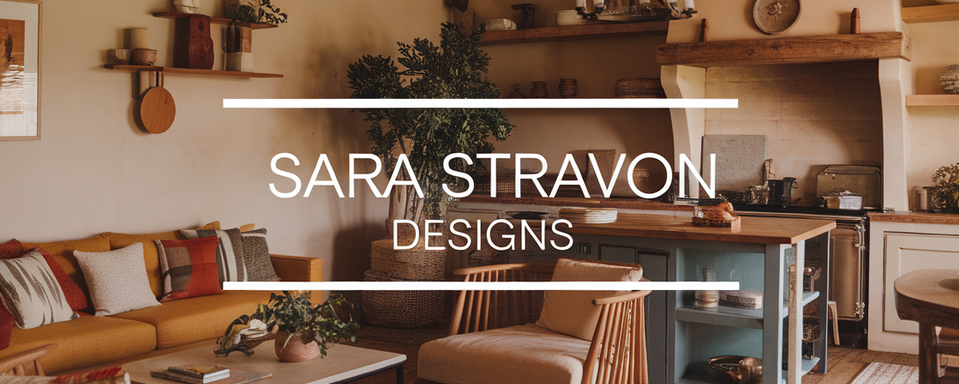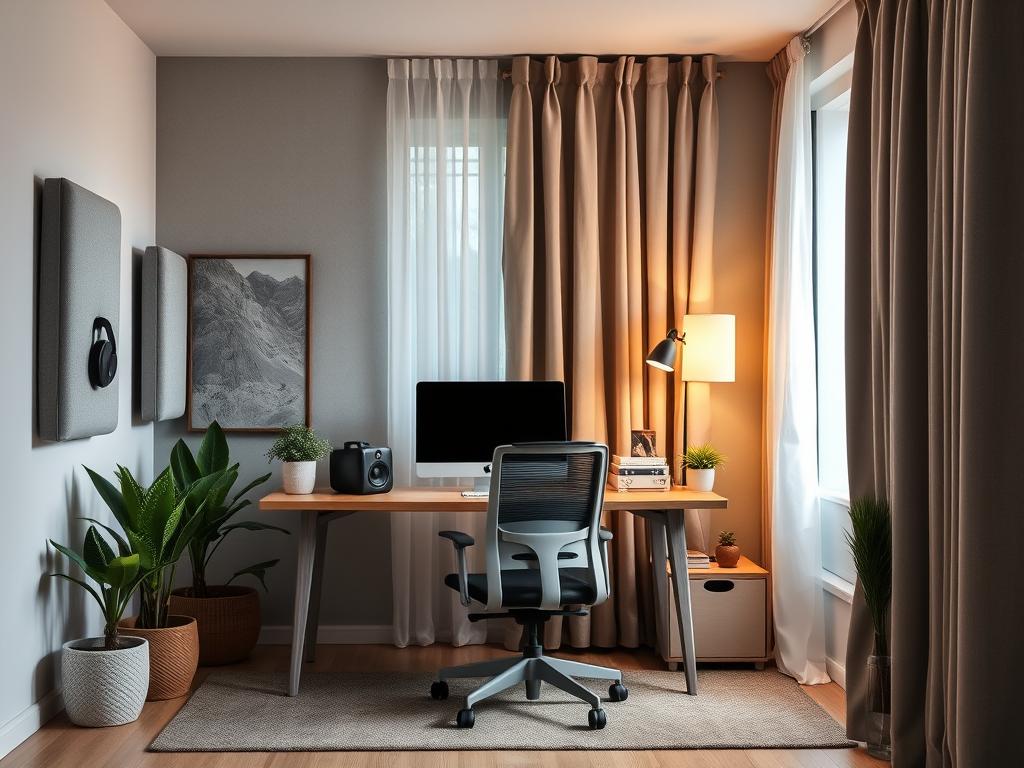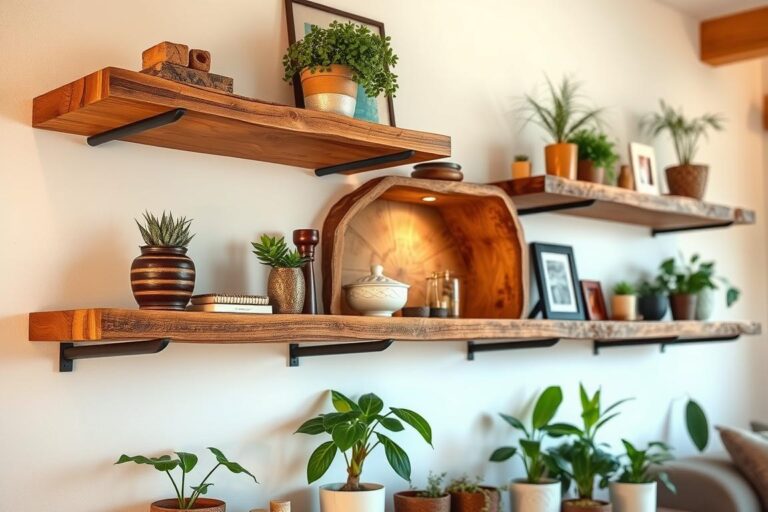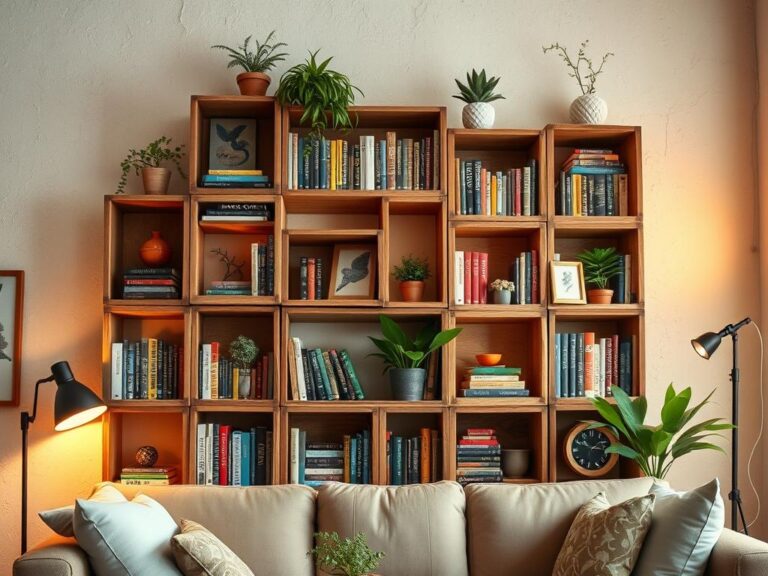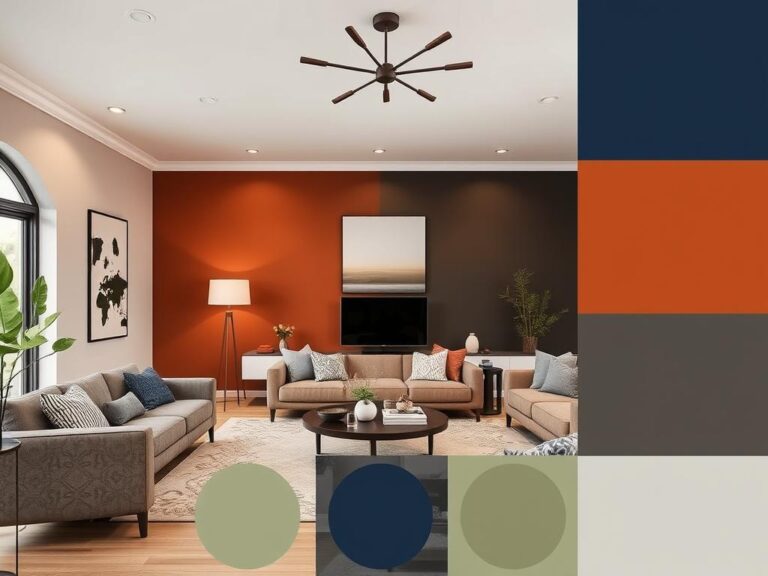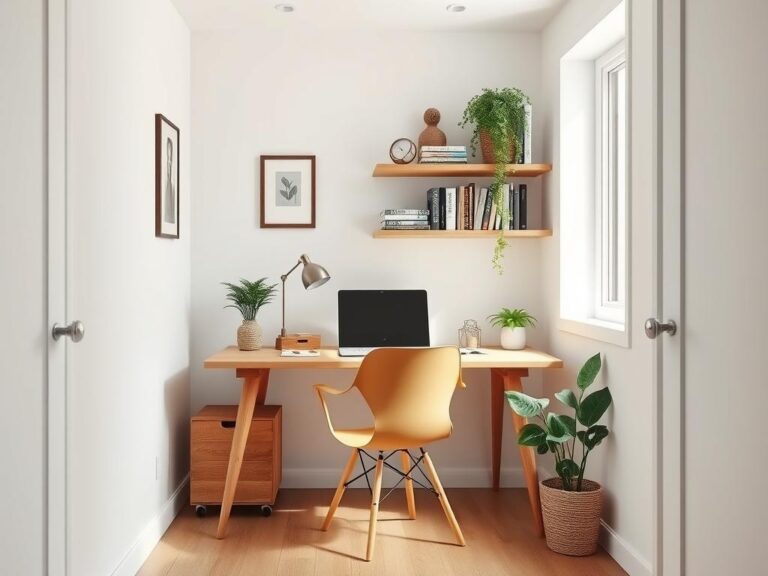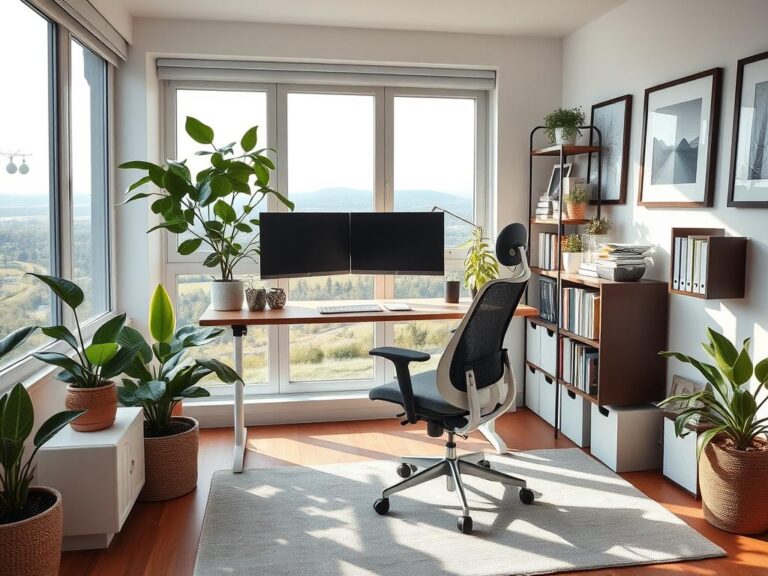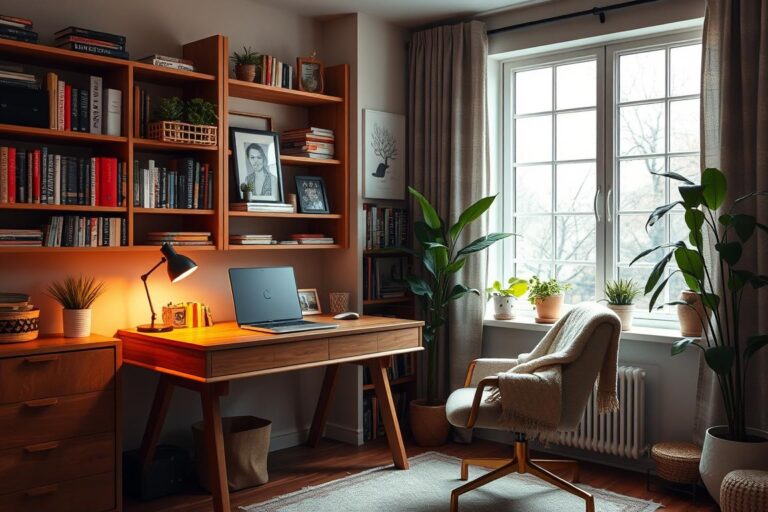Working from home brings both challenges and comforts. Noise is a big problem for staying focused and productive. It can be kids playing, street sounds, or household noises. These distractions can mess up your work and make you stressed.
Creating a quiet space is key for better work. It helps you focus and relax. A recent survey found 53 percent of remote workers struggle to separate work and personal life. This is because of constant interruptions.
These interruptions can make you stressed and less productive. So, it’s important to make your workspace quiet. Did you know you can make your home office quieter without spending a lot? Solid-core wood doors cost under $100 and help a lot with noise.
Soundproof curtains can also reduce noise from other rooms. Upgrading old windows can block a lot of outside noise. Adding window inserts can block up to 70 percent of outdoor noise, making your space quieter.
Want more tips? A rug is not just stylish for your workspace. It also helps soundproof it, adding to a peaceful work environment.
The Importance of a Quiet Workspace
Having a quiet workspace is key for staying productive and focused. Loud noises can cause stress, making our work quality drop and taking longer to finish. Our home office setup greatly affects how well we can concentrate and stay on task.
By cutting down on distractions at home, we create a space that boosts both efficiency and mental health.
Focus on Tasks
A quiet space helps us focus better, leading to better memory and work quality. With fewer interruptions, we can fully focus on our tasks. This results in higher quality work.
Sealing gaps and using noise-reducing tools can greatly reduce outside noise. This makes it easier to concentrate.
Reduce Stress
Less noise means less stress, which is great for a healthy work-life balance. A quiet place helps us manage our emotions better, making us happier and more productive. Studies show that loud office noises harm employee well-being.
Participate in Work Calls
A quiet space is essential for work calls and video chats. It looks professional and ensures we communicate clearly. Office Evolution, for example, offers private offices for quiet calls and meetings.
For tips on making your workspace quieter, visit Sara Stravon Designs.
The ideal office noise level is about 50 decibels. This level keeps us healthy and productive, making our workspace peaceful and productive.
Common Noise Distractions in a Home Office
Creating a home office can be a dream. But, it comes with challenges, especially with noise. Distractions can really hurt your productivity. Let’s look at common noise distractions and how to reduce them.
Roommates, Family Members, and Pets
Family members, pets, and roommates can be big distractions. They can interrupt your work a lot. It’s important to have a quiet area for your office to reduce these distractions.
Outside Noises
Outside noises can also get in the way. Sounds like traffic, people talking, and construction are big distractions. They can ruin important calls. To block these noises, consider using double-glazed windows or interior window inserts.
Appliances
Appliances can also be noisy. From refrigerators to washing machines, they can be distracting. 15.2% of people said appliances were a big distraction. Choose quieter appliances and use sound-absorbing materials like curtains or rugs to help.
Choosing the Right Location for Your Home Office
When setting up your home office, picking the right spot is key. The right place can boost your productivity and cut down on distractions. Finding the perfect spot is a big step in making a calm workspace.
Avoid High Traffic Areas
Steer clear of busy spots like the living room or kitchen. These areas are always full of activity. They can interrupt your work, making it hard to focus.
Spare Rooms and Basements
For a better home office, consider a spare room, attic, or basement. These places are away from the main living areas, offering a quiet spot for work. Basements and attics are great because they often have fewer windows. This makes it easier to block out noise and distractions.
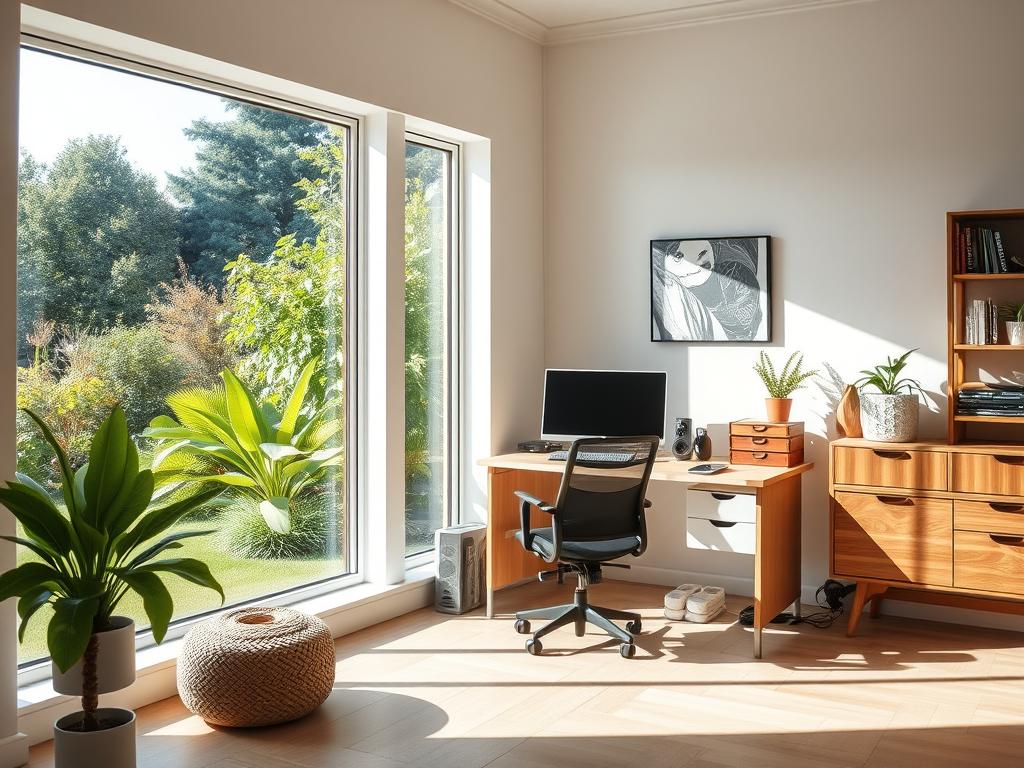
- Spare bedroom or guest room: Ideal for keeping work separate from home life.
- Attic or basement space: Often the quietest areas in the house, perfect for concentration.
By focusing on these tips, you can make a home office that helps you work well and comfortably. Choose spaces that naturally support a quieter environment.
| Common Locations | Benefits |
|---|---|
| Spare Bedroom | Quiet, isolated, and easy to soundproof. |
| Basement | Far from main living areas, naturally sound-insulated. |
| Attic | Removed from household noise, great for focused work. |
| Dedicated Office Room | Specifically purposed for work, offering optimal productivity. |
Spending time to pick the right spot for your home office and adding sound insulation can turn your workspace into a productive haven.
DIY Soundproofing Solutions
Struggling to find peace in your home office? Don’t worry, there are DIY soundproofing solutions that won’t cost a lot. A survey found 61.8% of people get distracted by noise at home. Here are some tips to help you focus better.
Adding Mass-Loaded Vinyl (MLV)
Adding Mass-Loaded Vinyl (MLV) to your walls is a budget-friendly option. MLV blocks and absorbs sound waves. It’s dense and easy to put on walls, ceilings, and floors. Read here for more on stylish home office ideas.
Installing Acoustic Foam Panels
Acoustic foam panels are great for reducing noise in your office. They’re not just for recording studios. They come in many colors and designs, fitting right into your decor. This method helps you stay focused in a quiet space.
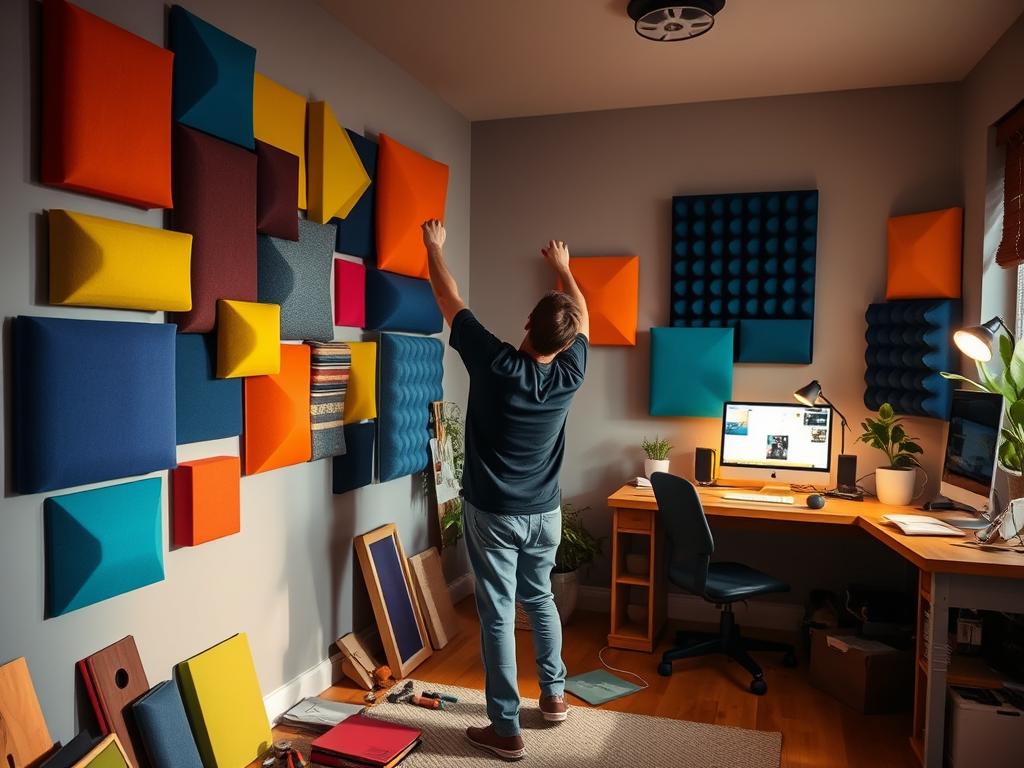
Using Door Sweeps
Doors can let sound through, but door sweeps can block this. They’re cheap and work well to soundproof your office. Just put them under your doors to keep sounds out. This small change can make a big difference in your office’s quietness.
Professional Noise Reduction Products
Having a quiet workspace at home can change everything. Investing in top-notch soundproofing products is key for those looking to reduce noise. Let’s explore some of the best options to make your home office a peaceful place.
Soundproof Curtains and Blankets
Soundproof curtains and blankets are top choices for blocking out noise. They absorb sound waves, making your space quieter. Acoustical Solutions offers the PrivacyShield® ABBC-13 Blanket, a favorite for home offices.
These products help cut down on distractions from family, roommates, and outside noises. No more background chatter to interrupt your work. It’s a game-changer for 61.8% of remote workers.
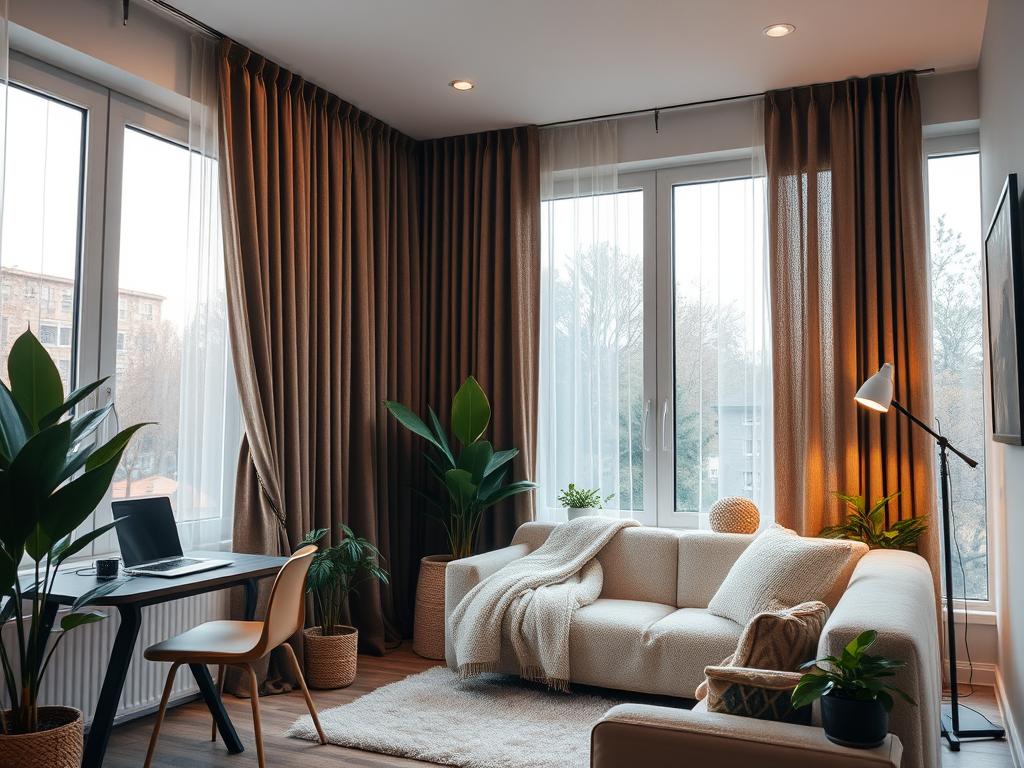
Upgrading Windows and Doors
Improving your home office’s sound quality also means upgrading windows and doors. Double or triple-pane windows and solid-core doors block more noise than standard ones. It’s a bigger upfront cost, but the quieter work environment is worth it.
According to Silentium, using these products can cut distractions by up to 90%. It’s like having a bubble of silence around you. Sounds amazing, right?
Creating a quiet and productive home office is achievable. With the right soundproofing products, anyone can have a balanced and noise-free space for work.
Reducing Noise Home Office Techniques
Turning your home office into a quiet space is a big change. Moving furniture and adding soft items can really help. These changes can make your work area quieter and more focused.
Start by moving bookshelves to shared walls. This adds style and blocks sound well. Also, area rugs and curtains can soak up sound, making your space calmer and more productive.
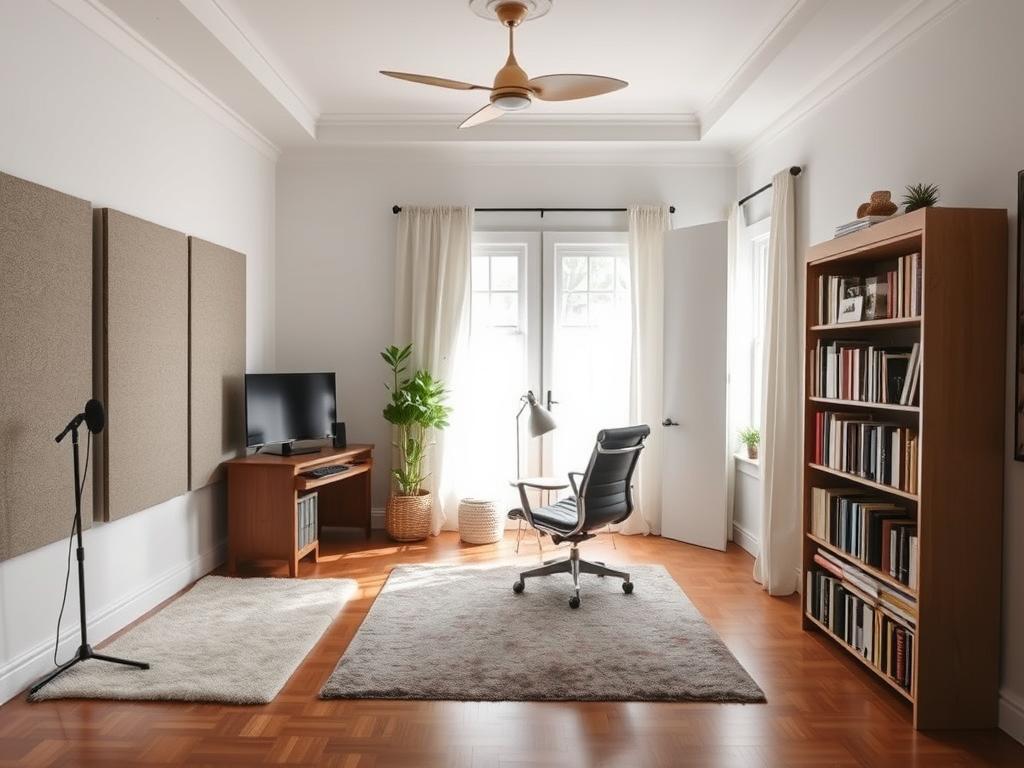
Studies show that 46.6% of remote workers face distractions from family, roommates, or pets. Another 15.2% get annoyed by running appliances. It’s a common problem for those working from home.
Here’s a handy table to comprehend the common noise distractions and their prevalence:
| Source of Noise | Percentage Reported |
|---|---|
| Family, Roommates, Pets | 46.6% |
| Running Appliances | 15.2% |
| Outside Noises (Neighbors, Cars, Construction) | 64.8% |
| No Distractions | 12.4% |
Using wall hangings is another smart move. Heavy tapestries or art can block noise. Don’t forget door sweeps and sealing gaps with weather-stripping tape. These small steps can greatly improve your focus and work quality.
Also, moving appliances away from your office can reduce distractions. Combining these small changes with bigger soundproofing efforts can make a big difference.
Try these soundproofing tips and see how they improve your work environment. You’ll likely notice a big change in your productivity and peace of mind.
Shared Home Office Soundproofing Tips
Creating a quiet and productive shared home office is a common challenge. With some planning, you can reduce office noise. Here’s how:
Acoustic Partitions
Acoustic partitions are great for dividing your space and reducing sound. They’re perfect for offices shared with partners or family. They block sound waves, making quiet zones for each person.
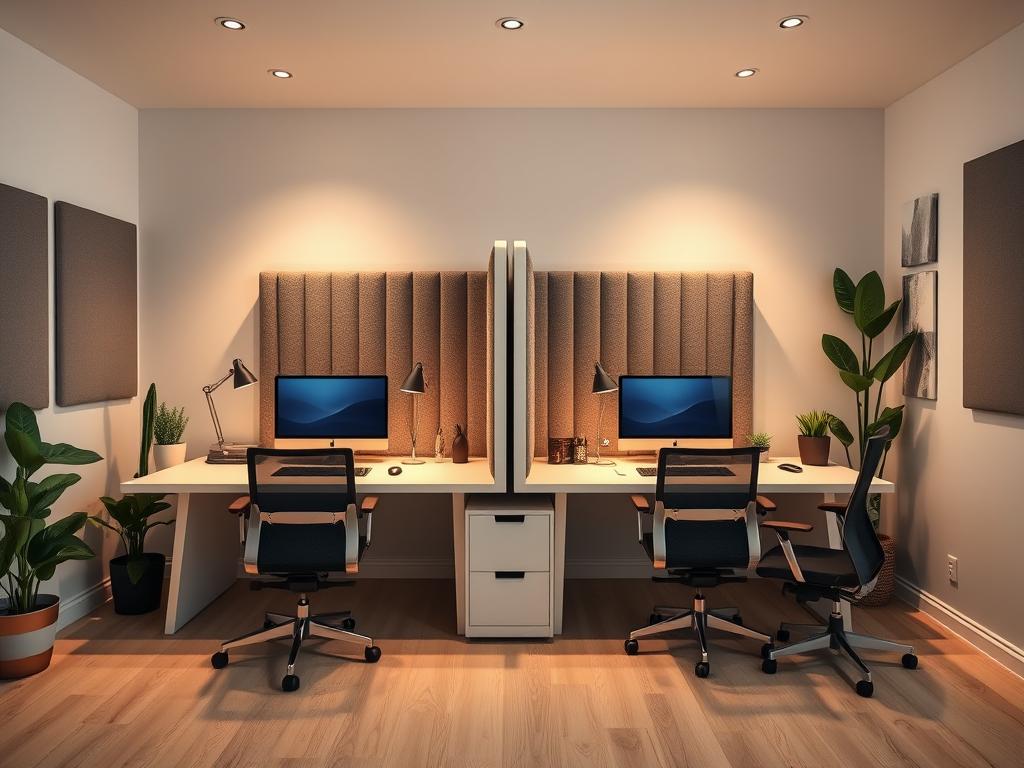
Soundproof Curtains
Soundproof curtains are also key in cutting down office noise. They add style to your office and block out external sounds. Hang them to add an extra layer of quiet.
Here’s a look at the benefits of these solutions in your shared home office:
| Solution | Noise Reduction Capacity | Additional Benefits |
|---|---|---|
| Acoustic Partitions | High | Provides privacy, versatile |
| Soundproof Curtains | Moderate | Reduces external noise, aesthetic enhancement |
Sound Insulation Ideas
Improving your home office’s sound starts with good insulation. It helps block out family noise, traffic, and appliance sounds. Here are some ideas to make your workspace more comfortable.
Wall Insulation
Wall insulation is crucial for blocking sounds. You can use special materials in wall cavities to reduce noise. This makes your space quieter and helps you work better.
Ceiling and Floor Insulation
Don’t forget about the ceiling and floors when improving your office’s sound. Ceiling insulation stops noise from upstairs or downstairs. Floor insulation does the same, making your space quieter.
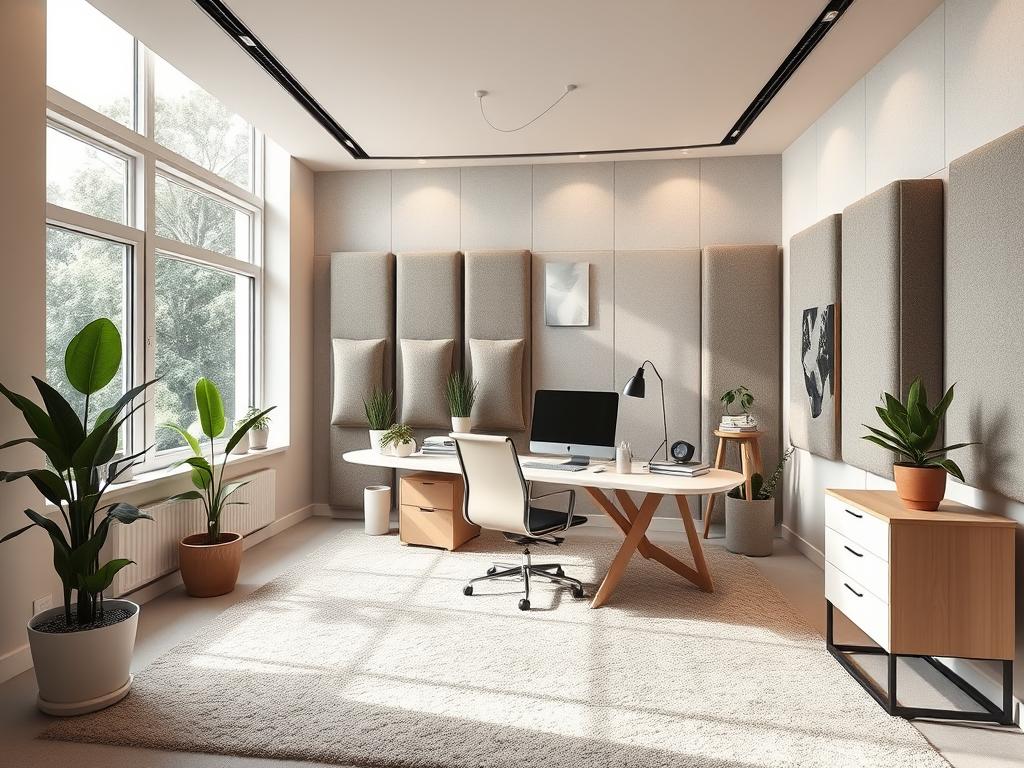
Benefits of a Quiet Workspace
A quiet workspace is a game-changer, trust me! The benefits are endless. First, let’s talk about how peaceful environments boost productivity. When it’s calm, you can dive deep into work without distractions.
Studies show quiet workspaces lead to more done and better quality work. Why? Fewer interruptions mean clearer thinking and better focus.
In today’s chaotic world, quiet offices offer more than just productivity. They also reduce stress and anxiety. Imagine working in a calm space where you can breathe easier.
Quiet environments also improve your professional image during online meetings. No background noise means you can present your best self. This can boost your career and job satisfaction.
Companies are now moving away from open offices to quiet spaces. These spaces encourage deep thought and innovative solutions. Investing in quiet workspaces is about being healthier, more focused, and happier.
Using Technology to Minimize Noise
Outside noise can really get in the way of our focus. Luckily, there are amazing tech solutions to help. These tools use advanced soundproofing to make our workspaces better.
Noise-Canceling Headphones
Noise-canceling headphones have changed the game for many working from home. They use active noise-canceling tech to block out background noise. Brands like Bose and Sony have top models.
These headphones are perfect for work calls or meeting deadlines. They keep ambient noise at bay. A study found 30% of cubicle workers are unhappy with noise levels. This makes investing in these headphones a smart choice.
White Noise Machines
White noise machines are also great for reducing background noise. They create a constant sound that covers up other noises. This makes your work area feel calmer.
Seven white noise machines are recommended for offices. For example, the AVANTEK White Noise Sound Machine has six settings and 30 volume levels. The Douni Sleep Sound Machine has 10 nature sounds and white noise options.
Adding these tools to your home office can greatly improve it. It turns into a quiet space where you can focus and be productive.
